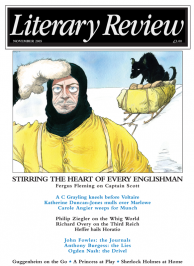Tom Fleming
What Lies Beneath
A Crack in the Edge of the World: The Great American Earthquake of 1906
By Simon Winchester
Viking 412pp £16.99
The allure of California – its climate, its mineral wealth – has always been offset by its precarious position on the geological map. The San Francisco earthquake of 1906 saw a city that had gotten rich quick thanks to the gold rush find its fertile ground being torn from under it; but, as Simon Winchester’s thorough account of the disaster makes clear, it was geological innocence rather than any innate Californian hubris – or general ineptitude – that allowed the earthquake to have such an effect.
San Francisco’s population saw its most rapid growth in the mid nineteenth century, after James Marshall had found those first gold flakes near Sacramento. It was a hastily constructed city, which had learned to cater for single men in search of a quick fortune: a place of assembly-line brothels and

Sign Up to our newsletter
Receive free articles, highlights from the archive, news, details of prizes, and much more.@Lit_Review
Follow Literary Review on Twitter
Twitter Feed
Though Jean-Michel Basquiat was a sensation in his lifetime, it was thirty years after his death that one of his pieces fetched a record price of $110.5 million.
Stephen Smith explores the artist's starry afterlife.
Stephen Smith - Paint Fast, Die Young
Stephen Smith: Paint Fast, Die Young - Jean-Michel Basquiat: The Making of an Icon by Doug Woodham
literaryreview.co.uk
15th-century news transmission was a slow business, reliant on horses and ships. As the centuries passed, though, mass newspapers and faster transport sped things up.
John Adamson examines how this evolution changed Europe.
John Adamson - Hold the Front Page
John Adamson: Hold the Front Page - The Great Exchange: Making the News in Early Modern Europe by Joad Raymond Wren
literaryreview.co.uk
"Every page of "Killing the Dead" bursts with fresh insights and deliciously gory details. And, like all the best vampires, it’ll come back to haunt you long after you think you’re done."
✍️My review of John Blair's new book for @Lit_Review
Alexander Lee - Dead Men Walking
Alexander Lee: Dead Men Walking - Killing the Dead: Vampire Epidemics from Mesopotamia to the New World by John Blair
literaryreview.co.uk